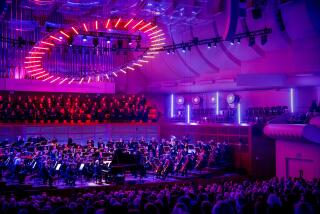MUSIC REVIEW : From Russia, With Passion
- Share via
In piano competitions, as in wars, sometimes the apparent victors lose out, or sink into oblivion, while the nominal losers live on to rise again--with a vengeance.
That is certainly demonstrable in recent encounters we have had with former finalists in the prestigious Van Cliburn International Competition.
Last weekend, Andre-Michel Schub, first-prize winner in the 1981 Fort Worth sweepstakes, returned here and gave a low-voltage recital at the South Bay Center for the Arts; those who stayed awake had to admire him.
Thursday night, in her West Coast debut at Ambassador Auditorium, Elisso Bolkvadze, who won sixth place in the 1989 Cliburn Competition, took the Pasadena hall by storm.
The 24-year-old pianist, who--according to an official at the Cliburn Foundation in Fort Worth--has not appeared outside the Soviet Union since the competition, impressed with her virtuosity, her personality, the depth of her artistry and--not least--her maturity.
She gave one of the more provocative recitals of the season now ending: unhackneyed but exposing sonatas by Beethoven, Scriabin and Prokofiev surrounding two strong examples of her Chopin-playing. There was no waffling or gratification-postponement in this performance; what you heard was what you got.
And what you heard was brilliant--a kaleidoscopic realization of already-colorful music, produced with personality, assurance, taste and power.
To Beethoven’s virtuoso-defeating Sonata in C, Opus 2, No. 3, Bolkvadze brought sure and independent fingers, an analytical sense of structure and unflagging musical comprehension.
To Chopin’s Nocturne in C-sharp minor, Opus 27, No. 1, she delivered smooth, silky tone, a wide range of Romantic dynamics, limpid coloration and an informed directionalism. The same composer’s Scherzo in E showed Bolkvadze a classically minded Chopin interpreter, one who keeps in mind forms as much as goals. Only here, out of this generous program, did her piano sound sometimes grow prickly and overbright.
To the many technical and musical challenges in the oft-neglected Second Sonatas of both Scriabin and Prokofiev the slender pianist rose without flinching.
Where rhetorical confusion threatened to materialize, she clarified all statements. Where passage work piled up, she unraveled musical threads. Through both sonatas, she projected her many reactions, the composers’ sensibilities and the inner workings of each movement deftly. Seldom has either of these works seemed so fraught with meaning and full of feelings as under Bolkvadze’s ministrations.
At the end, when her audience loudly demanded encores, she obliged with only one: as fast, as clear and as pretty a run-through of Chopin’s Etude in F, Opus 10, No. 8, as one might dream of hearing.
More to Read
The biggest entertainment stories
Get our big stories about Hollywood, film, television, music, arts, culture and more right in your inbox as soon as they publish.
You may occasionally receive promotional content from the Los Angeles Times.










